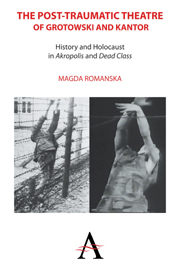 The Post-traumatic Theatre of Grotowski and Kantor
The Post-traumatic Theatre of Grotowski and Kantor from Part I - Our Auschwitz: Grotowski's Akropolis
If Wyspiański's Akropolis is an attempt to capture, condense and understand the Polish psyche at the end of the nineteenth century, Grotowski's Akropolis is an attempt to capture, condense and understand the new twentieth-century Polish consciousness, one forever framed by the smoke from the Auschwitz ovens. The fact that Grotowski chose Akropolis as his framework for a performance piece that seeks to respond to the trauma of the Holocaust is not accidental. Grotowski enters into a dialogue with Wyspiański, but to gain an understanding of what this dialogue entails, we must first understand the historical context surrounding the publication and production history of Wyspiański's drama. At the turn of the twentieth century, around the time Jarry wrote Ubu, Poland – in tune with its bleak European image – was swept by Romantic dreams of national greatness characterized by a combination of ironic self-awareness and fatalistic determination. As Margaret Croyden sums it up: “Periodically invaded, partitioned, dismembered, oppressed, and brutalized, and itself guilty of oppression and backwardness, Poland has embodied the modern tragedy in a world dominated by great powers. It has also come to symbolize heroic resistance to those powers, resistance depicted through the years by its great writers, poets and composers, and in our time by its film and theater directors as well.” Writing Akropolis, Wyspiański followed the tradition of engaging in political dialogue about Poland's liberatory project.
To save this book to your Kindle, first ensure [email protected] is added to your Approved Personal Document E-mail List under your Personal Document Settings on the Manage Your Content and Devices page of your Amazon account. Then enter the ‘name’ part of your Kindle email address below. Find out more about saving to your Kindle.
Note you can select to save to either the @free.kindle.com or @kindle.com variations. ‘@free.kindle.com’ emails are free but can only be saved to your device when it is connected to wi-fi. ‘@kindle.com’ emails can be delivered even when you are not connected to wi-fi, but note that service fees apply.
Find out more about the Kindle Personal Document Service.
To save content items to your account, please confirm that you agree to abide by our usage policies. If this is the first time you use this feature, you will be asked to authorise Cambridge Core to connect with your account. Find out more about saving content to Dropbox.
To save content items to your account, please confirm that you agree to abide by our usage policies. If this is the first time you use this feature, you will be asked to authorise Cambridge Core to connect with your account. Find out more about saving content to Google Drive.